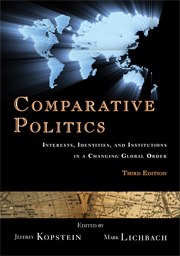Book contents
- Frontmatter
- Contents
- List of Maps
- Preface to the Third Edition
- List of Contributors
- 1 What Is Comparative Politics?
- 2 The Framework of Analysis
- PART ONE EARLY DEVELOPERS
- PART TWO MIDDLE DEVELOPERS
- PART THREE LATE DEVELOPERS
- PART FOUR EXPERIMENTAL DEVELOPERS
- 9 Mexico
- 10 India
- 11 Iran
- 12 South Africa
- 13 The European Union
- 14 Nigeria
- STOP AND COMPARE
- Index
- References
11 - Iran
from PART FOUR - EXPERIMENTAL DEVELOPERS
- Frontmatter
- Contents
- List of Maps
- Preface to the Third Edition
- List of Contributors
- 1 What Is Comparative Politics?
- 2 The Framework of Analysis
- PART ONE EARLY DEVELOPERS
- PART TWO MIDDLE DEVELOPERS
- PART THREE LATE DEVELOPERS
- PART FOUR EXPERIMENTAL DEVELOPERS
- 9 Mexico
- 10 India
- 11 Iran
- 12 South Africa
- 13 The European Union
- 14 Nigeria
- STOP AND COMPARE
- Index
- References
Summary
Introduction
At the turn of the twentieth century, Iran embarked on a path to development that was typical of many late developers. Iran's experience, however, has proved to be unique. Development was accompanied by ideological conflicts that culminated in a religiously inspired revolution in 1979. In the process, a modernizing monarchy gave place to the theocratic and revolutionary politics of the Islamic Republic of Iran (the official name of Iran since the revolution). As populism changed the character of the economy and Islamic ideology (a political doctrine based on Islam) transformed Iranian society, its norms, institutions, and, for a time at least, pursuit of its interests were subsumed under preservation of identity. Since the revolution, the nature of development has been complex, revealing modernizing impulses tempered by the pressures of Islamic ideology. Beyond its ideological and institutional particularities, the Islamic Republic shares many of the characteristics and problems of populist authoritarian regimes elsewhere in the developing world: a bloated public sector, mismanagement, and corruption.
There are three distinct and yet interrelated periods in Iran's modern development: the early and later Pahlavi (the dynasty that ruled Iran from 1925 to 1979) periods; those of Reza Shah Pahlavi (1925–1941) and Muhammad Reza Shah Pahlavi (1941–1979); and the Islamic Republic (1979–present). There is greater continuity between the first two periods, under the Pahlavi monarchs, although there are notable differences as well. The Reza Shah period coincided with the rise of the modern Iranian state and started the process of development.
- Type
- Chapter
- Information
- Comparative PoliticsInterests, Identities, and Institutions in a Changing Global Order, pp. 418 - 459Publisher: Cambridge University PressPrint publication year: 2008

